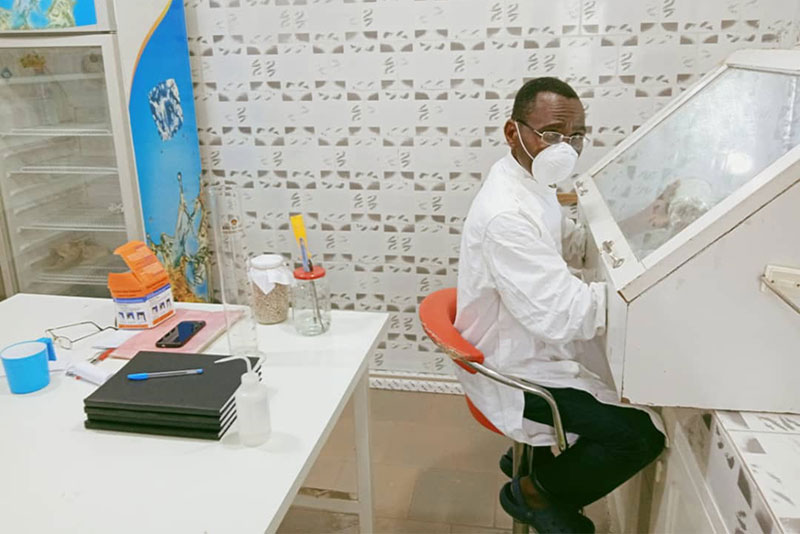By Gessye Safou-Mat
Five months ago, I was in Brazzaville, my hometown, celebrating my sister’s wedding. Guests filled the streets and joined a happy crowd, dancing and dining to the drumming sounds of the Tam Tams. I returned to my apartment in D.C. with no other worry than landing safely—a stark contrast with now, when social distancing is the norm: six feet away from friends, and 6,000 miles away from family, with no end in sight.
Just before the March 31 lockdown (which was lifted on May 18), my country had 19 cases and zero deaths. But cases of COVID-19 are increasing in the Republic of the Congo (often confused with the Democratic Republic of Congo). As of May 26, we have had 569 cases (161 recovered) and 19 deaths in a population of about 5.2 million people.
When restrictions were first announced, with a mere two business days’ notice, I wondered about how the most vulnerable people in my country would cope. Most of our people work in the informal sector and earn their livelihoods on a day-to-day basis—which is hard to do when confined. I’ve tried to reach out to those who need help the most: My family and friends led a fundraising drive to donate food items to four orphanages in Brazzaville, and we arranged for $60 mobile money transfers to 20 vulnerable young people across the country who requested help buying groceries.

Gessye Ginelle Safou-Mat. Photo: Aimeryl Safou-Mat
But the need far exceeds such efforts. With so many people struggling, and so many others—like those in my community back home—trying to help, I reached out to Congolese friends here and in the Congo for a better understanding of the situation. Though I’m far from home, after just a few calls I felt like I was back on the streets of Brazzaville.
Remittances Dip, But Generosity Continues
Noel Karl Lebondzo, a DC-based Youth Advisory Council Representative for the Congo and member of the African Diaspora Network, has spent the last couple of months preoccupied by the same worries that I have. To “show our solidarity, even if we’re far away and facing the brunt of this crisis ourselves,” he launched a fundraiser to encourage the Congolese diaspora across the U.S. to donate money toward supplies that would go to poor people affected by this crisis. He collected around $3,000 and was able to distribute food, gloves, and sanitizing gels to more than 100 families.
Lebondzo reminded me that the economic fallout from the pandemic made it difficult for Congolese in other countries to send remittances and other financial assistance to our families back home. This is in line with the World Bank’s prediction of a sharp decline of remittances.
Concerns about remittances were echoed by my long-time friend, financial consultant Momo Bazoungoula, in a call from her Harrisburg, Pennsylvania, apartment. Her part-time job in life insurance—which requires contact with clients—has been affected by the pandemic. She used to send about $500 each month to her mom and sister in Congo, but now she can send only about a third of that.
“It’s hard to hear how hard it has been for them, but we have no choice,” she said.
Despite this, Bazoungoula is currently working with the local charitable organization “Living Water” to help sponsor 10 vulnerable people in Brazzaville and provide for their basic needs.
Back home, problems with remittances were heightened further because many of Congo’s money transfer agencies were operating with skeleton staffs and several branches were closed completely during the lockdown. Among the open ones, long lines and wait times deter people from retrieving international funds.
The popularity of local money transfers, however, is on the rise. “Mobile money has been working extremely well,” said my friend Jennie Bouesse Jean Kassa, the Founder and Designer of Zebi Wax, a Congolese brand that sells African clothing and accessories. “We use it to send and receive transfers within the country, using our mobile phones. It’s quite affordable and very accessible—with many more points of sale throughout the city. This is helpful in limiting exposure to the virus.”
But sales have been nonexistent for the past month, as in other shops—and the results are rippling through society. “Everyone can feel the brunt of the pandemic,” she said. “I can’t take care of my mother like I did before. A lot of us are in the informal sector, so a month without activities means no income, which means I have less to give. We try to help but it is difficult.”
Small Companies Bearing the Brunt of the Crisis
To learn more about the challenges and resilience of business owners, I called Loïc Mackosso, a friend of a friend. He is the managing partner of Aries Investissements, a financial advisory company supporting clients in the structuring and financing of their investments in Africa. One such advisory service was for the upgrade of three airports in the Congo. Like many companies, Mackosso and his cofounder Regis Matondo had to furlough their employees. The two of them continued teleworking to maintain minimal activity around their deals.
Then I checked back with my stylish friend Kassa, this time over Facebook messenger. Zebi Wax sales are now 50 percent lower than they would be in a normal year, but she still has a clientele.
The new circumstances have forced her to be creative. “The coronavirus has conceptually changed my way of leading Zebi Wax,” she said. “We have refined our marketing strategy toward a more digital one. At first, I was completely shut down but since I found out that international shipping companies like DHL have been working, I’ve been able to fulfill my international orders. In Brazzaville though, I am still yet to do so since internal movement is restricted.”
The restriction of movement has significantly challenged travel agencies in the Congo, as it has in other countries. Rosine Ndounga is the head of IATA travel agency in Brazzaville, which is closed since there are no commercial flights.
She told me that “what is scary is the financial crisis. No activities mean no wages at the end of the month. Luckily, my fiancé is still working.” Ndounga, who is pregnant, is using this time to rest. “I was afraid of the health situation in my country. Being outside is scarier than being confined. I can protect my child better this way.”

At Kinata’s lab, an employee prepares for the first mushroom harvest. Photo: Courtesy of Kinata SARL
Like Ndounga, my cousin Junior Massamba, who lives in Pointe-Noire, has also created new marketing strategies to help his business survive the economic fallout. Although he works with an oil company, he is also the founder of taKinata, a mushroom cultivation agribusiness. In the Congo, mushrooms are only available for a month, during the rainy season. Kinata seeks to provide organically-grown mushrooms all year long.
“Unfortunately, our objective of launching a large production coincided with the start of the lockdown. We were stuck since it is a perishable product and restaurants were closed,” said Massamba. “We used the downtime to shift online for our marketing. We’ve been meeting the demand that way and providing a delivery service as well.”
Looking Forward
According to Loïc Mackosso, the COVID-19 pandemic has shed light on investment opportunities in the Congo, especially in key sectors like agriculture, agribusiness, and the pharmaceutical industry.
“We’ve met many entrepreneurs working on innovative solutions that need the attention of investors. The weaknesses observed during the crisis must be transformed into strength. We strongly invite investors to join us to tackle this challenge of funding African entrepreneurs and unleash their full potential,” said Mackosso.
These calls and conversations gave me hope. They inspired me to see a new era where my country embraces innovation and technology. And as for my country’s most vulnerable people, I believe all of us have a part to play in helping them stay healthy and sustain their livelihoods. I have learned in much greater detail the variety of ways that citizens near and far are doing just that.
I would have never guessed that my visit home five months ago—where I was among crowds that packed streets to celebrate a joyful milestone—would be my last trip for a while. Until I can go back to Congo and see my friends and family, #restezchezvous, as we say—let’s stay home.
Published in May 2020

